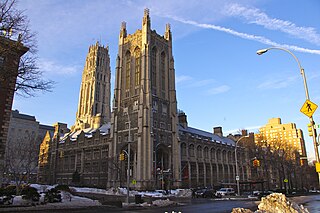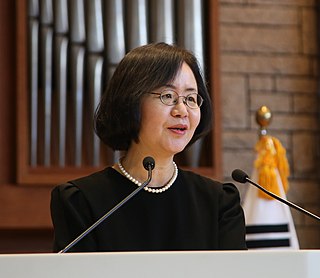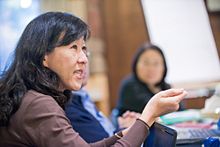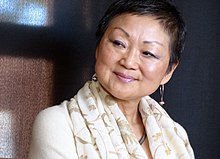Feminist theology is a movement found in several religions, including Buddhism, Hinduism, Sikhism, Neopaganism, Baháʼí Faith, Judaism, Christianity and New Thought, to reconsider the traditions, practices, scriptures, and theologies of those religions from a feminist perspective. Some of the goals of feminist theology include increasing the role of women among clergy and religious authorities, reinterpreting patriarchal (male-dominated) imagery and language about God, determining women's place in relation to career and motherhood, studying images of women in the religions' sacred texts, and matriarchal religion.
Systematic theology, or systematics, is a discipline of Christian theology that formulates an orderly, rational, and coherent account of the doctrines of the Christian faith. It addresses issues such as what the Bible teaches about certain topics or what is true about God and His universe. It also builds on biblical disciplines, church history, as well as biblical and historical theology. Systematic theology shares its systematic tasks with other disciplines such as constructive theology, dogmatics, ethics, apologetics, and philosophy of religion.

Womanism, originating from the insightful words of African American author Alice Walker in her 1983 book In Search of Our Mother's Garden: Womanist Prose, is a term denoting a movement within feminism, primarily championed by Black feminists. Walker coined the term "womanist" in the short story Coming Apart in 1979. Her initial use of the term evolved to envelop a spectrum of issues and perspectives facing black women and others.

The Goddess movement is a revivalistic Neopagan religious movement which includes spiritual beliefs and practices that emerged predominantly in the Western world during the 1970s. The movement grew as a reaction both against Abrahamic religions, which have only gods with whom are referred by male pronouns, and secularism. It revolves around Goddess worship and the veneration for the divine feminine, and may include a focus on women or on one or more understandings of gender or femininity.
Womanist theology is a methodological approach to theology which centers the experience and perspectives of Black women, particularly African-American women. The first generation of womanist theologians and ethicists began writing in the mid to late 1980s, and the field has since expanded significantly. The term has its roots in Alice Walker's writings on womanism. "Womanist theology" was first used in an article in 1987 by Delores S. Williams. Within Christian theological discourse, Womanist theology emerged as a corrective to early feminist theology written by white feminists that did not address the impact of race on women's lives, or take into account the realities faced by Black women within the United States. Similarly, womanist theologians highlighted the ways in which Black theology, written predominantly by male theologians, failed to consider the perspectives and insights of Black women. Scholars who espouse womanist theology are not monolithic nor do they adopt each aspect of Walker's definition. Yet, these scholars often find kinship in their anti-sexist, antiracist and anti-classist commitments to feminist and liberation theologies.

Chung Hyun Kyung is a South Korean Christian theologian. She is a lay theologian of the Presbyterian Church of Korea, and is also an Associate Professor of Ecumenical Theology at Union Theological Seminary in the United States.
Minjung theology emerged in the 1970s from the experience of South Korean Christians in the struggle for social justice. It is a people's theology, and, according to its authors, "a development of the political hermeneutics of the Gospel in terms of the Korean reality." It is part of a wider Asian theological ferment, but it was not designed for export. It "is firmly rooted in a particular situation, and growing out of the struggles of Christians who embrace their own history as well as the universal message of the Bible."
Mercy Amba Ewudziwa Oduyoye is a Ghanaian Methodist theologian known for her work in African women's theologies and theological anthropology. She is currently the Director of the Institute of African Women in Religion and Culture at Trinity Theological Seminary, Ghana. She founded the Circle of Concerned African Theologians in Ghana in 1987 to promote the visibility and publishing agenda of African women Theologians.

David Kwang-sun Suh an ordained minister of the Presbyterian Church of Korea and was the dean of the College of Liberal Arts and Sciences at Ewha Womans University of Seoul, Korea until he was arrested in 1980. He is perhaps best known as a major representative of the first generation of Korean minjung theologians. He was the President of the World Alliance of YMCAs from 1994 to 1998.
Re-Imagining was a Minneapolis interfaith conference of clergy, laypeople, and feminist theologians in 1993 that stirred controversy in U.S. Mainline Protestant denominations, ultimately resulting in the firing of the highest ranking woman in the Presbyterian Church (U.S.A.). Re-Imagining: A Global Theological Conference By Women: For Men and Women, grew out of a U.S.A. Mainline Protestant response to the World Council of Churches' Ecumenical Decade: Churches in Solidarity with Women 1988–1998. Participants met at the Minneapolis Convention Center during November 4 through 7, 1993.

Jacquelyn Grant is an American theologian, a Methodist minister. Alongside Katie Cannon, Delores S. Williams, and Kelly Brown Douglas, Grant is considered one of the four founders of womanist theology. Womanist theology addresses theology from the viewpoint of Black women, reflecting on both their perspectives and experience in regards to faith and moral standards. Grant is currently the Callaway Professor of Systematic Theology at the Interdenominational Theological Center in Atlanta.

Henriette Marianne Katoppo was an Indonesian novelist and internationally known Asian feminist theologian. She was a recipient of the S.E.A. Write Award.
Political theology in sub-Saharan Africa deals with the relationship of theology and politics born from and/or specific to the circumstances of the region. Arising from the anti-apartheid struggle in South Africa and nationalist campaigns of the mid- to late twentieth century elsewhere, the increasing numbers of Christians in sub-Saharan Africa has led to an increased interest in Christian responses to the region's continuing issues of poverty, violence, and war. According to the Cameroonian theologian and sociologist Jean-Marc Éla, African Christianity "has to be formulated from the struggles of our people, from their joys, from their pains, from their hopes and from their frustrations today." African theology is heavily influenced by liberation theology, global black theology, and postcolonial theology.

Kwok Pui-lan is a Hong Kong-born feminist theologian known for her work on Asian feminist theology and postcolonial theology.
The Ecumenical Association of Third World Theologians (EATWOT) is a network of theologians coming primarily from Africa, Asia, and Latin America and interested in creating theology that is relevant for their contexts. The group tended to critique traditional Christian theology as being too European and underscored the need for theology that addressed the challenges of poverty and oppression.
Virginia Fabella, M. M. is a Filipina theologian and Maryknoll sister, known for her works in Asian feminist theology and postcolonial theology.
Postcolonial theology is the application of postcolonial criticism to Christian theology. As is in postcolonial discourse, the term postcolonial is used without a hyphen, denoting an intellectual reaction against the colonial, instead of being merely sequential to it.
Muriel Orevillo-Montenegro is a Filipina theologian known for her writings in Asian feminist theology. She is a Human Rights activist and Peace and Justice advocate.

Meehyun Chung is a professor of the United Graduate School of Theology in Yonsei University and serving as the first female chaplain of Yonsei University. She was the editor of Korean Journal of Systematic Theology.
Park Soon-kyung was a South Korean Methodist theologian.











